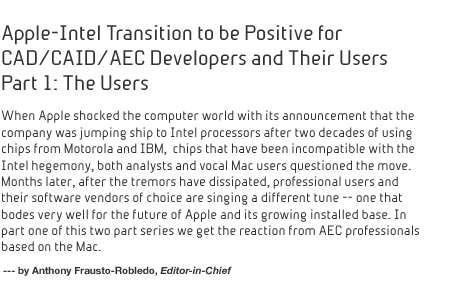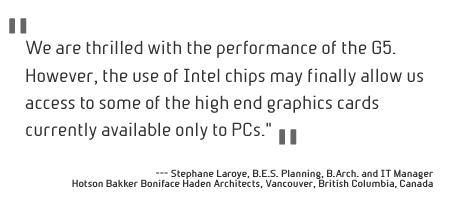| 
Impact
on Mac Sales
When
Apple Computer announced its startling plans to switch
to Intel's x86 processors beginning next year,
the general press was quick to react with both positive
and negative assessments. On the immediate negative side,
as many Wall Street analysts were correct to point out,
was that end users may question the logic of purchasing
further IBM and Motorola PowerPC chip based Macintosh
computers in the interim between mid 2005 and the
early part of 2006. To make matters worse, Apple said
they weren't expecting to produce professional computers
with Intel chips until sometime as late as 2007. Analysts
were correct to question a serious slowing down of sales
of Macintosh computers, reasoning that users would prefer
to wait for the Intel Macs.
In
regards to the professional Macintosh user, Architosh decided to feel out the market for a reaction to this
news. What we found was both surprising and reassuring.
The reassuring part was that current pro CAD users on
the Mac understand with a high degree of confidence as
to what this transition will mean to them. After all,
they have been through it before. Hence, for them there
is absolutely no sense that this is a cause for panic
or for considering switching platforms (Mac to Windows).
The surprising part was that pro Mac users don't see
the Intel announcement affecting their PowerPC purchase
decisions at all.

Architect
and IT professional, Stephane Laroye, of the Vancouver-based
architecture firm, Hotson Bakker
Boniface Haden Architects said
the change was unlikely to affect their purchasing decisions
of current G5-based
desktops. "We are thrilled with the performance
of the G5. However, the use of Intel chips may finally
allow us access to some of the high end graphics cards
currently available only to PCs."
Stephane's
comments illustrate an interesting optimism shared by
many pro users who see
nothing particularly wrong with Apple's current crop
of pro machines. Yet, they are quick to point out excitement
about those items that the Mac platform has failed to
obtain over the years -- workstation
class graphics cards
being a particularly desired item.
Other
AEC professionals said that their purchasing
cycles are more tied directly to their
businesses than to
what Apple or Intel is doing with chips and machines. "In
our firm, purchases tend to be made on an ongoing 'as
needed' basis," said Andrew Bobyn, MAIBC, MArch,
an associate architect at Cornerstone Architecture in Canada. "Project
and staff scheduling probably has more of an immediate effect
on hardware purchases than processor type," said Andrew. "That
being said, however, I imagine some firms may delay some
less critical hardware purchases, until the newer machines
are revealed."
However,
some professionals we spoke to brought up the fact that
purchasing Macintosh machines
today will affect them, likely,
when these machines are phased out in the future. Grant Brumpton,
BCSLA, a landscape architect in British Columbia with the
firm, PWL Partnership Landscape Architecture, said that "as
the year or so progresses, until Intel Macs are released,
it will definitely affect purchases decisions with regards
to addressing obsolescence." Continuing he remarked: "Expansion
of our office work force will mean we will likely continue
to make Mac purchases within this window."
Performance
Concerns
When
it comes to the state of Mac performance, the move to
Intel has drawn mixed
reaction across the board. Many
users who are deeply embedded in 3d work flows have wondered
why Apple chose Intel over AMD, since many professionals
consider their Opterons superior to anything Intel has to offer.
Continued >
page
| 1 | 2 | 3 |
|






![]()
![]()